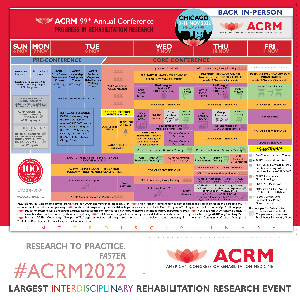Back
Diversity, Equity and Inclusion
Functionality and Disability: Perspective of Rehabilitation Professionals in Brazil
Friday, November 11, 2022
9:45 AM – 9:50 AM
Location: Station 2
- IM
Indyara A. Morais, n/a
Ph.D Candidate
University of Brasilia
Brasilia, Distrito Federal, Brazil
Presenting Author(s)
Research Objectives: To analyze how professionals in rehabilitation services in Brazil perceive the concept of disability and functionality considering the International Classification of Functioning, Disability, and Health in the daily routine of services and assessment of disability
Design: This is a cross-sectional qualitative study, using 26 interviews with professionals of public rehabilitation services from the Brazilian Unified Health System. These interviews were conducted in the virtual format in 2019, draining the validation process of the disability assessment instrument called Modified Brazilian Functionality Index. A questionnaire was formulated with open questions about the concept of disability, assessment of disability, perceptions about the contextual factors, functionality, and social aspects of disability.
Setting: Professionals of Specialized Centers in Rehabilitation and Psychosocial Care from eight different states of Brazil
Participants: It interviewed nine different professional categories from public services
Interventions: All professionals received training about the biopsychological model of disability, on which the instrument was based on it.
Main Outcome Measures: The health Professionals interviewed began to identify disability as a lack of functionality, using the aspects of difficulty and limitation as synonymous.
Results: From the interviews was possible to identify the change in the view of the disability of the biomedical model to the biopsychosocial model. However, the issue of difficulty and functionality is central to this new look. Moreover, social aspects had a central aspect when considering the assessment of disability, including environmental and personal barriers. The professionals interviewed understood that with an expanded evaluation, rehabilitation care becomes singular respecting the patient's needs.
Conclusions: By using, an abord concept of disability and functionality the professionals can provide singular rehabilitation activities, focusing and aspects of daily life, also the social barriers.
Author(s) Disclosures: The evaluation of disability permeates the understanding of the concept of disability and functionality. The government needs to invest in training because by promoting professional qualifications, it is perceived that professionals become more engaged in promoting care focused on all aspects of the patient's life, not only on the biomedical look of treatment.
Design: This is a cross-sectional qualitative study, using 26 interviews with professionals of public rehabilitation services from the Brazilian Unified Health System. These interviews were conducted in the virtual format in 2019, draining the validation process of the disability assessment instrument called Modified Brazilian Functionality Index. A questionnaire was formulated with open questions about the concept of disability, assessment of disability, perceptions about the contextual factors, functionality, and social aspects of disability.
Setting: Professionals of Specialized Centers in Rehabilitation and Psychosocial Care from eight different states of Brazil
Participants: It interviewed nine different professional categories from public services
Interventions: All professionals received training about the biopsychological model of disability, on which the instrument was based on it.
Main Outcome Measures: The health Professionals interviewed began to identify disability as a lack of functionality, using the aspects of difficulty and limitation as synonymous.
Results: From the interviews was possible to identify the change in the view of the disability of the biomedical model to the biopsychosocial model. However, the issue of difficulty and functionality is central to this new look. Moreover, social aspects had a central aspect when considering the assessment of disability, including environmental and personal barriers. The professionals interviewed understood that with an expanded evaluation, rehabilitation care becomes singular respecting the patient's needs.
Conclusions: By using, an abord concept of disability and functionality the professionals can provide singular rehabilitation activities, focusing and aspects of daily life, also the social barriers.
Author(s) Disclosures: The evaluation of disability permeates the understanding of the concept of disability and functionality. The government needs to invest in training because by promoting professional qualifications, it is perceived that professionals become more engaged in promoting care focused on all aspects of the patient's life, not only on the biomedical look of treatment.
Learning Objectives:
- Understand how the assessment of disability with biopsychological model can improve the care in rehabilitation
- The importance of training of health professionals
- Discuss about the relation between functionality and disability

.jpg)
